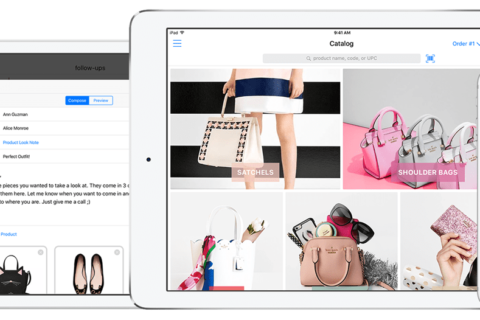The Canadian Company Who Has Created a BFF Shopping App With a Human Touch
If you go into a store and the sales clerk knows what you love and hate and what you've bought before, she's not a mindreader. She's just good at her job and she's probably using Tulip.
“Could Tulip prevent a Narcos: Mexico-like retail mishap from happening?” I asked. “A what?” laughed Ali Asaria, the CEO of Tulip, a Toronto-based mobile IOS app designed to help sales folk make your IRL shopping experience better. Asaria had just joined our conversation, as he was busy working the company’s booth at the recent National Retail Federation trade show in New York City. I gave him a quick recap of the scene where Gallardo, a drug lord, takes a little karmic hit when a sales associate in a luxury jewellery store asks his wife if she’s enjoying her new watch. The hitch: He didn’t buy it for her. Busted. “Oops!” laughed Asaria. “I have heard that this can be a real challenge. We can help our clients represent customer information in certain ways.”
That’s a delicate way to say that his clients—Chanel, Mulberry, David Yurman, De Beers Jewellers, Veronica Beard, Coach, Saks Fifth Avenue, Kate Spade, Michael Kors and Bonobos to name a few—can decide what sensitive and relevant information a sales associate needs to know while working with a customer. But not every sales associate has access to all profiles. “This is especially important with celebrities,” explained Saira Zia, a retail excellence consultant with Tulip. “You can’t have Kanye West’s profile open to everyone!” For us average shoppers, who aren’t celebs or the mistresses of drug lords, the Tulip app can help make us feel like we’re getting A-list treatment because when we walk into the store, the associates can interact with us like we’re shopping BFFs. They’ll either create a profile or tap into an existing one on the iPad they’re carrying and, voila, they’ll know our size, what we’ve bought in the past (either in a store or online), what we love and what we hate based on our past shopping behaviours. If we express an interest in an item while we’re chatting, they can discreetly send a message to a “runner” to go and retrieve it. If we love it, we can buy it from them on the spot, thus avoiding any annoying lineups at the cash register. If they don’t have what we’re looking for—or, like Bonobos, they only “showroom” their items—they can instantly find the item online for us to order and have it sent to our home. The feature is aptly called the “endless aisle,” and it’s been a hit with their clients. “At the Bonobos stores that use Tulip, they’ve noticed a 12% increase in average sales,” explained Zia. “At Michael Kors, they’ve doubled their endless aisle sales. It’s been huge for them.”
A few days later, we may even get an email from them thanking us for coming in and perhaps suggesting some other items we might be interested in based on our profile (e.g., this client loves new handbags in red leather with gold embellishments and she has a significant birthday coming up next month). While you may think they’re reaching out because you’re so unforgettable—which could totally be the case—it’s likely because the Tulip app has sent them a reminder to follow up with a note. The upside: It’s got the timeliness of a chat bot, but it’s a real letter versus a canned message from a machine. “We believe that there is a resurgence in retail, and it’s coming from a desire to have more human-to-human interaction instead of just digital,” explained Asaria, who was also the 19-year-old mastermind behind BlackBerry’s wildly addictive Brick Breaker. “Tulip wants to be a part of that.” So, as it turns out, Asaria has gone from breaking bricks to being a bricks-and-mortar champion.








